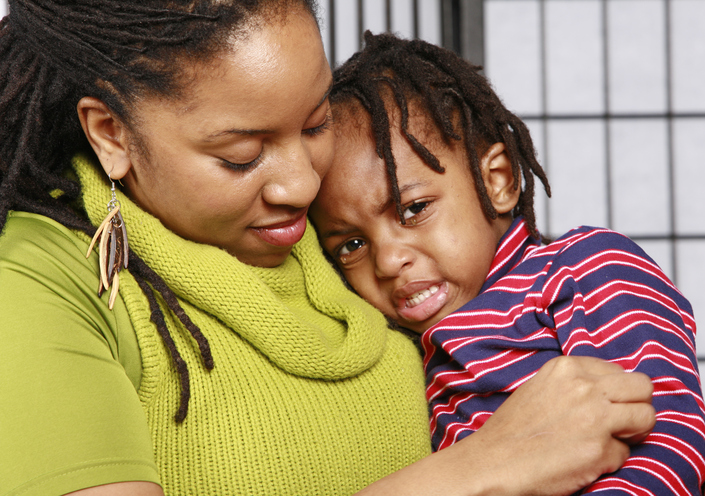
Your infant was happy to be held by Grandma, loved being talked to by Uncle Fred and was all smiles when you left her at daycare. Suddenly, at about six months old, your child cries whenever you leave the room and clings to you when Grandma wants to play. What is happening?
Your baby has developed the sense of “object permanence”. Previously, when you were out of sight, your baby didn’t understand that you still exist, and she didn’t really think about you coming back as long as she was fed and diapered. Now, your baby knows that people and things out of her sight range do still exist and when you leave her sight, she is concerned that you may not come back. As she has no sense of time, it doesn’t matter if it’s for a minute or for hours – she’s going to cry until Mom or Dad – or both – is in her sight again.
Separation anxiety can develop anytime between 4 months and 2-1/2 years, and is sometimes triggered by life events, such as the arrival of a new sibling, family challenges or a new home.
Sometimes, dealing with separation anxiety is more difficult for parents than it is for the child! There are a few things you can do to to ease or avoid separation anxiety – both for your child and yourself.
Avoid starting new childcare or sitters between the ages of 4 months and one year, when your child first develops object permanence. If you cannot avoid a new care situation, visit together with the new caregiver several times before you leave him for any length of time. If possible, leave him for a just a short time before you leave him for a full day or longer period of time.
Consider your child’s mood when you must leave her. Make sure she has napped, is fed and is newly diapered before separating, so there is no physical discomfort to exacerbate her anxiety.
Tell her when you’ll be back, even when she’s just six months old. Use time frames that are easy to understand, such as “Daddy will pick you up after you play with Nana in the park” or “I’ll be here to get you after lunch.”
Goodbye rituals will help your child understand that you’re going to leave now and you’re going to come back. Create a phrase you say every time you leave, such as “Love you to the moon and back”. Pay full attention to your child when you use this phrase, give him a kiss and hug and then leave – no turning back.
Always follow through on pickup times. While we know life can get in the way of a flawless schedule, your child can’t understand why “traffic” is more important than he is. Make sure you give your child a larger window of time than you’ll actually need to return for him. Being surprised by Dad being early often is much better than the anxiety your child will feel if Dad is late once. If things go wildly awry, make sure you call your caregiver and have them explain that Dad is very sorry he’s going to be late, but he’ll be there by bath time.
Trust your instincts. If your child is not sleeping, not eating or is refusing a caregiver, it’s time to look carefully at what could be happening when you’re not there.
Most children will grow out of separation anxiety before they enter preschool. If your child’s anxiety continues, or if it seems extreme, resulting in panic attacks, nightmares or excessive worry, call Alzein Pediatrics at 708-424-7600 or click the yellow “Book an Appointment” button on the left. We’ll be happy to help your family.


